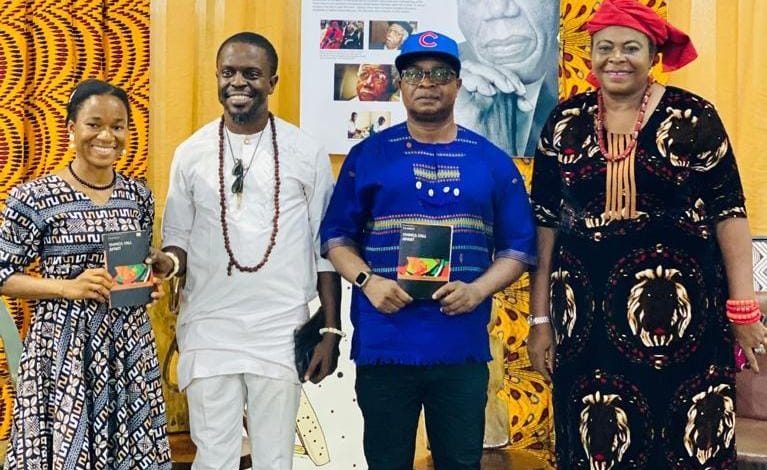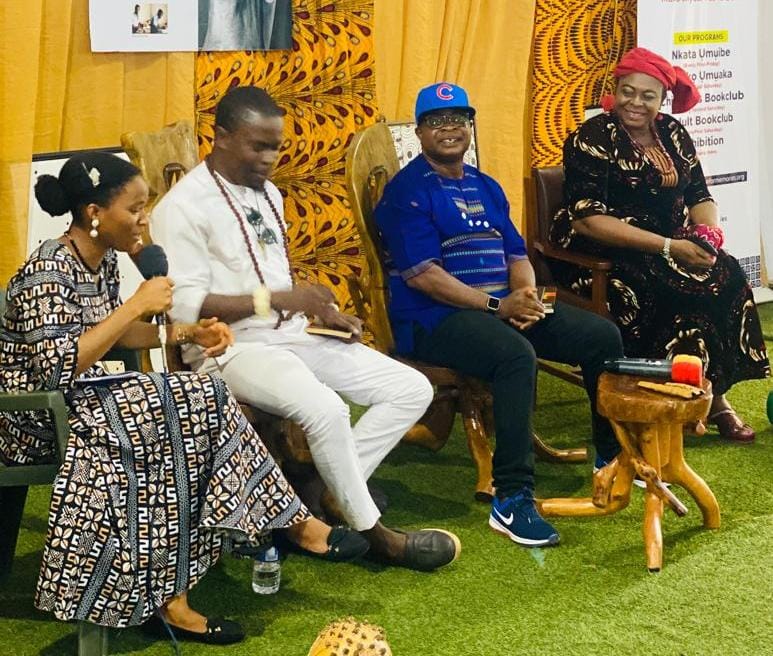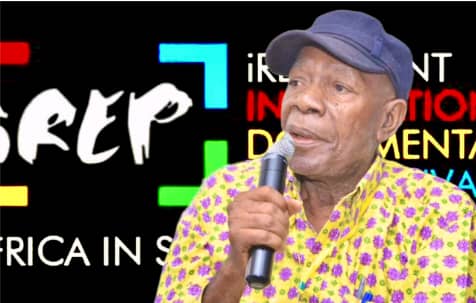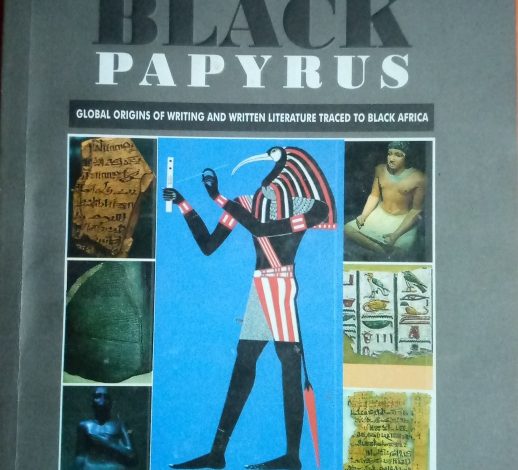Can we have a lazy hero?: Exploring Unoka at the 66th anniversary celebration of ‘Things Fall Apart’ in Enugu

By Ugochukwu Anadi
WHEN on Monday, June 17, 2024, people from different walks of life gathered physically at the Centre For Memories, Enugu, Nigeria, with many others joining virtually from different parts of the country and beyond, it was to celebrate the genius of Chinua Achebe, that legendary literary giant. It was also to celebrate the 66th anniversary of his magnum opus, Things Fall Apart, a book that has forever changed the African and global literary landscape. Most importantly, it was a gathering of readers and admirers of Achebe who have begun to re-examine Achebe’s narrator’s description of Unoka, the father of the protagonist Okonkwo, as “lazy and improvident,” in the novel.
It would never have occurred to the people of Umuofia, where the novel was set, that this man they regarded as a “failure” and a “loafer” will one day draw such a critical attention, but that is the genius of Achebe that has given Things Fall Apart its staying power: its inexhaustible well of insights that yield to numerous interpretations and reinterpretations. To draw from this well, the Centre For Memories, Enugu invited Achebe’s readers and scholars to reflect on the theme, “Rethinking Unoka in Chinua Achebe’s Things Fall Apart: The Place of Artists in a Society That Underappreciates Art.”
The evening commenced with the showing of some old video clips featuring Achebe. The first clip was a 1964 video of the National Educational Television where Wole Soyinka and South Africa’s Lewis Nkosi interviewed Achebe on his debut, Things Fall Apart. At the time the interview was conducted, Achebe had also published his second book, No Longer At Ease, and had the third of what would later be regarded as the African trilogy, Arrow of God, filed for publication. The interview took place at the National Museum, Lagos. There, many of us were introduced or reintroduced to these esteemed writers and intellectuals at their younger age. The depth of thought they showed in that interview even at that young age goes to affirm a saying in the Igbo nation of Achebe that “ọkụkọ ga-abụ oke na-ebido n’eju,” for indeed the chick that will grow into a cock starts showing the signs from the nest.
Another interview, this time around recorded on the 50th anniversary of Things Fall Apart by PBS NewsHour in faraway US was shown the audience. The Achebe we see in the clip speaking with the American journalist, Jeffery Brown, has already written many other books spanning across the genres of fiction, poetry, nonfiction and even scholarship, has won the Man Booker International Prize and has been partially paralysed after an accident in Nigeria and rendered wheel chair-bound. It was this Achebe, sporting the black beret that would become a sort of trademark style for him who health-related issues had forced out of his beloved Nigeria, a country he has elsewhere written to be “gifted, enormously talented, prodigiously endowed and incredibly wayward” that was interviewed by Mr. Brown. One big takeaway from that interview is when Achebe said that he “knew that something needed to be done” when he began to miss his own story in the stories that he read. A gap was there in the world literature and Achebe rose to fill it; something needed to be done and he did not wait for someone else to do it for him. If you don’t like someone’s story, you can go about showing what is wrong with the story, which is a valid approach to take, but Achebe takes the more sublime approach, he simply writes his own, in the way fiction can be true.
From these two old video clips of Achebe we moved to hear from Achebe’s fans who also doubled as Unoka’s fans. There is Ikhide Ikhleoa who has written a blog article on “The Unoka in Us” and Kelechi Deca, who maintains that the Umuofia of the time of Unoka uunde-appreciated art just like Nigeria today still does, leading to the country’s loss of many artistically-talented individuals to other countries where they are better appreciated. Mr. Deca also looked at the name Unoka, a name that emphasises the supremacy of the homestead, pointing out the irony inherent in the fact that the only character with that name in Achebe’s works ends up failing as “a father, provider and protector…at everything that was held sacrosanct and valuable according to the times he lived.” For Deca, Unoka fails not because he is incompetent as a human being, but because he was judged by the “core competencies” of the others who were warriors and farmers, even those of them like Okoye who was also an artist. Deca’s reflection, especially on the Igbo proverb that “ogbu opi ga-ezi imi,” a proverb that insists that the flutist must also be well remunerated would set the mood for the panel discussion on the theme—the exercise to determine whether it was Unoka that failed his society or it was the society that failed Unoka.
The panel was moderated by Anulika Iwobi and had Dr. Iyke Erojikwe, a theatre practitioner and scholar from the University of Nigeria, Nsukka, poet and social commentator, James Ngwu Eze and a professor of English and Literary Studies also from the University of Nigeria Nsukka, Florence Orabueze.
Prof. Orabueze opens the panel discussion by drawing attention to the fact that our society still under appreciates art. She uses the university system which she is most familiar with as an example. For one, the university admission system reserves more quota for students coming in to study the science and technology-related courses than for those going into the arts, humanities and social sciences. Also, when it comes to research grants, most of the grants, she informs us, are reserved for the sciences because of the erroneous idea that those in the arts and humanities do not produce anything. This wrong understanding of the type of knowledge production these departments are meant to engage in occurs despite the fact that the artists, especially the literary artists, from Achebe to Soyinka to Adichie and Chika Unigwe are the ones placing the country’s name on a global pedestal. The professor did not fail to use the opportunity to shade her colleagues on the other side of knowledge production. Directing the question of production to them, she asks, “where are their inventions?” The hunter, it seems, has become the hunted.

Panel session on Unoka in Chinua Achebe’s Things Fall Apart: moderator, Anulika Iwoba (left); Dr.Iyke Erojikwe; James Ngwu Eze and Prof. Florence Orabueze
Eze joins the discussion by tracing a brief trajectory of his life’s journey. Economic and financial reasons, and even mere curiosity may have driven him to many other areas of human endeavours, but the Muse keeps calling, making him and people like him feel “irretrievably compelled to practise their art.” Such that even as a journalist, he would write with such an artistic bent that he would later become a literary editor at Sunday Sun. As a banker, he would still be instrumental to the establishment of the defunct Fidelity Bank International Creative Writing Workshop series, curated by Chimamanda Ngozi Adichie. Even as a public servant and Chief Press Secretary to the former governor of Anambra State, he brought poetry to Government House and later edited a collection of well-written speeches that are today still studied by scholars in the field of literature and linguistics. Eze’s story helps us understand the kind of compulsion and attachment Unoka must have felt to his flute that even when he was being carried to the evil forest to die, he clutched to it. It helps us better understand why Unoka could not have just dropped the flute and carried the hoe or machete like the agrarian and masculine society of Umuofia demands of him. Not only because as Pablo Picasso would say, “art washes away from the soul the dust of everyday life”, but also because, as misery is his lot he remains true to his art when chosen by the Muse.
In his own contribution, Dr. Erojikwe faults the current curriculum as one of the problems theatre art students and graduates face when it comes to making a living from their art. Even with the under-appreciated nature of art in the country, Erojikwe seems to say that there are still ways theatre can be taught and practised such that the theatre artist would not just get the satisfaction that comes from practising one’s art but also be able to pay their bills. He cites an example with the staging of Ikénga, a dramatic recreation of the Igbo Landing event in America slave trade era he co-wrote and produced with four other thespians. In the production, they leveraged on live-viewing technologies to make money from many people outside the university community who were interested in the play, and by so doing raised more money from those who joined virtually than from those who physically visited the theatre to see the show. The university don also lamented that the under-appreciation of the work of the theatre artists seems to be worse in universities in the Eastern part of the country, citing examples of some other places in the Western part of the country where he had engaged in theatre productions and was far better remunerated.
Eze agrees with Dr. Erojikwe on the radical role the artists’ embrace of technology can play in their appreciation. The artist of today, he notes, has more avenues of financial remuneration unlike Unoka. At the time of Unoka, the artist must also be a farmer, like Okoye, or a warrior or both to survive, but today, the artist can create and sell identity on social media platforms. Examples abound of many writers and artists who do this today, people who have cultivated an organic and dedicated thousands, if not millions, of followership on social media that should they release any book or song today, thousands and millions of people are ready who will purchase or stream it. Using himself as a practical example of how this can be achieved, he tells the audience that with him at the event was a lady who captures his responses to questions thrown to him in the panel, with the pictures and videos gotten being generously upload to his social media accounts for his followers to see. In less than 24 hours after the event, I checked Eze’s Facebook account and those pictures and videos were live.
While this is a wonderful solution for the artist, a privilege is being overlooked here. That is the privilege of having a good device for such image and video-capturing and having a friend or an employee on hand to get such captures. Even when this problem is solved, the artist has to, added to being an artist, be a marketer and publicity person to be able to handle these well, or at least have enough funds to hire experts. For Eze who has garnered experiences from his stints in communication, journalism and PR, these may come easily and naturally, but for the artist like Unoka, who only has his flute at his material time, how viable is this solution?
Prof. Orabueze directs the discussion back to Unoka as depicted in Achebe’s Things Fall Apart. For Orabueze, the description of Unoka as a failure does not hold, no matter how it is considered. Such a description, she notes, does an injustice to the many skills and abilities of Unoka. Unoka, she maintains, was a deep thinker, a philosopher even. Was it not Unoka who “always said that whenever he saw a dead man’s mouth he saw the folly of not eating what one had in one’s lifetime”? The same Unoka who said that “A proud heart can survive a general failure because such a failure does not prick its pride. It is more difficult and more bitter when a man fails alone.” That Unoka may be an eash-going man given to his “gourds of palm-wine”, but he is definitely not one who does not think. For the professor, the characterisation of Unoka as a coward because he “could not bear the sight of blood” is wrong. It simply shows that Unoka is someone who values the preservation of human life, and by extension, the environment, unlike his son Okonkwo who sees these things as things to be conquered. Prof. Orabueze also draws attention to two vital things many critics normally miss when talking about Unoka’s status as a notorious debtor: his impeccable record keeping skills and his diplomatic oratory. With his record keeping skill, he converts his wall into a sort of Microsoft Excel spreadsheet with rows and columns marked by lines that represent what he owes each person. He “owed every neighbour some money” and even when he does not pay back, he is still being lent money because his tongue is like that of the snail that smoothly glides its way to safety even over spikes, a skill highly needed in conflict resolution and diplomacy.
Orabueze, who is also a feminist scholar, nuances the contempt with which Unoka is held, especially by his son Okonkwo, by pointing out that Unoka represents the feminine essence of the community. Umuofia, as already stated, is a patriarchal society that has a complicated relationship with femininity. On the one hand, to be feminine is to be weak and undesirable in a man; on the other hand, some of the most respected deities and their servants are female. Orabueze maintains that the disrespect meted out to Unoka has a lot to do with the fact that he did not fit into the type of masculinity revered in Umuofia, a type of masculinity the scholar Daniel Chukwuemeka has elsewhere referred to as a “hustler masculinity.” I personally have a problem with Orabueze’s designation of Unoka’s sort of masculinity as representing the feminine essence of Umuofia society. While her submission problematises the singular sort of masculinity extolled in Umuofia, it also contributes to it by framing Unoka’s personality as feminine rather than as another way of practising masculinity, thereby still keying into the Umuofian singular narrative of masculinity. Unoka’s is also a type of masculinity. It may be described, following the literary scholar, Uche Peter Umezuruike, as a receptive form of masculinity, but masculinity it still is.
When the discussion was opened to the audience, the first person to contribute raises an important question. While still maintaining that Unoka is a failure, citing anonymous examples of some other members of their Abuja Literary Society who are, like Unoka, doing nothing for themselves and feeling entitled to other people’s money simply because they are artists, he makes the point that the artist is just as talented as the driver, the teacher, the doctor, the vulcaniser, all of whom are legitimately making their own living rather than just feeling entitled to others’ money simply for being an artist. He then analyses Unoka, maintaining that by entertaining the society with his flute, he succeeds in fulfilling the artist’s duty to his society; by becoming a master of the flute, he succeeds in the artist’s duty to his art which is to practise it and practise it well, but fails in the very first place he is expected to succeed, his homestead. The question was then asked, “what is the duty of the artist to himself and his dependents?”
As Prof. Orabueze would point out in her reply, the question indeed misses some vital points. The teacher, the driver, the vulcaniser, and others already have societal structures in place to reward their trade while that of the artist still remains shaky where they exist, and that is indeed the point of the whole discussion and not exonerating the artist from being a responsible father, mother, son, or daughter, as the man seems to receive it. Aside from that, David Cronenberg and Karl Appel will never agree that Unoka was a failure to himself as an artist. If for the former “the artist’s duty to himself is a combination of immense responsibility and immense irresponsibility”, the two of which must interlock, Unoka who did not fail in his responsibility to make art and entertain his people with the flute cannot be considered a failure for being irresponsible when it comes to making money. Appel captures Unoka best when he asserts that “the duty of the artist is not to be calculating in any sense, so that he may be free himself of human emotions while carried by the universal forces of life. Only then does one not think about making art, or about styles, or directions. Something comes about, something happens.”
As more members of the audience weigh in on the discussion, plates of well prepared abacha exchanged hands, serenading the environment with an aroma Unoka himself would be proud of while large quantities of palm wine left the jugs into the cups of attendants. The taste of palm wine on the tongue is the best way to understand why Unoka always spent the little money that comes into his hands on “gourds of plam-wine.” Holding my cup of palm-wine and taking it there made me pity those who joined virtually. It seems indeed that there is a limit to how technology can aid the artist.
Lest I forget, some pupils from a school whose name I have forgotten joined the celebration by rendering some popular quotes from Things Fall Apart. Members of the Ijele Renaissance Theatre also joined in the celebration by reenacting some scenes in the novel that featured Unoka. As the evening fades into night, one can hear the sound of the flute announcing that some people have decided that we can indeed have a lazy hero. I only hope that the flutist was well appreciated by the Centre for Memory, Enugu!
* Anadi is a contributor at The African Theatre magazine and Book Review Editor at Afreecan Read




